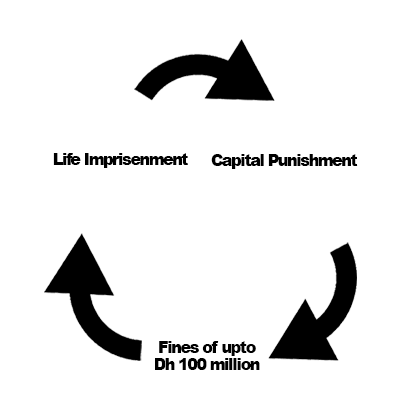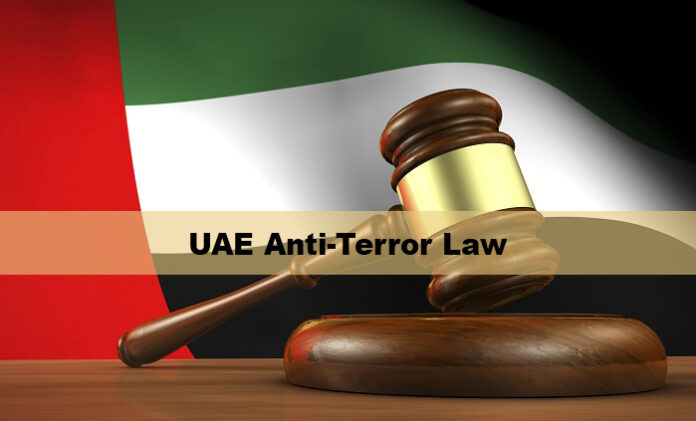The government of United Arab Emirates (UAE) recently promulgated an anti-terror law which further strengthened current legislative measures in a number of areas that are already in place. This is a right move in the right direction and fast-tracks tough measures against those found to be involved in terror acts.
Terrorism is a menace and no country in the world is immune from. Terrorism is not a new phenomenon and has been terrifying states and people alike around the world in the past and continues to do so today. It has already wreaked havoc and spread fear by misusing sacred religious and political philosophy. Now terrorism is a global phenomenon which needs global togetherness to fight it and the UAE is doing its bit to crackdown on this dangerous threat to survival, tolerance, interfaith harmony, productivity, progress, modernity and humanity.
Since its beginning, successive leaders of the UAE have been paying special attention to interfaith harmony, tolerance, development, democratization and respectfulness. Many external forces tried to destabilize the social, economic and political fabric of the UAE by promoting radicalization notions/gestures, spirits of hatred, distorted ideologies on human agencies and trying to pollute the innocent minds of common people by misinterpretation of religious beliefs/faiths. They also promoted ignorance and intolerance towards others in the region and around the globe.
The UAE’s counter-terrorism policies have shielded it from major attacks, but the country needs to stay vigilant and develop more comprehensive national security plans. UAE successfully marginalized and ultimately eliminated some external forces that tried to plot chaos/trouble internally in the country in 2012-2013. It showed its strong commitment to fight terrorism and guaranteed the safety and security of its citizens and people who live and work in the UAE. The Government of the UAE is to be commended for fast-tracking legislation with tough anti-terror measures to target those who would act in or support or finance acts of terror.
Salient Features of New Law
It covers all possible aspects of the counter-terrorism mechanism. It says as:
“Those who willingly participate in terrorist acts or cells, finance or provide succor to those who would commit terrorist acts, or support terrorism in all its ugly guises, face death penalty, life imprisonment and stiff punitive fines”.
Comprehensiveness
It is comprehensive act which strengthens current legislation in a number of areas that are already in place. For example, laws against money laundering by those who seek to finance their nefarious acts have already been put in place and this bill further strengthens those provisions.
In April, 2013 the Federal National Commission (FNC) passed a draft law to fight money laundering and terrorist financing. The bill strengthened the integrity of the country’s financial strengths in line with the International Standards on Combating Money Laundering and the Financing of Terrorism and Proliferation the FATF Recommendations.
The FATF Standards were revised in 2012 to strengthen global safeguards and provide governments with stronger tools to take action against financial crime. The draft law set up a national panel to be charged with fighting money laundering and terrorist financing. It would be comprised of representatives from the UAE’s Central Bank, ministries of Interior, Foreign Affairs, Justice, Finance, Economy, and Social Affairs, as well as state security and customs authorities, among other institutions.
Under the new rules, money launderers may face up to 10 years in prison, a fine of up to Dh500,000 or both. In the case of a business, the penalty is a fine ranging from between Dh300,000 and Dh1 million. Also, the proceeds of any money-laundering activity will be confiscated.
According to UN statistics, the amount of money being laundered globally in one year is nearly five per cent of global GDP, or $2 trillion (Dh7.34 trillion). An international training and research centre focused on countering violent extremism was approved by the Cabinet last year in the UAE.
Previously the Cabinet passed a law setting up the International Centre for Excellence in Countering Violent Extremism, Hedaya (Arabic for ‘guidance’), in Abu Dhabi. The think tank will forge a series of partnerships with credible institutions to carry out its activities. These partnerships will be held with the Geneva Centre for Security Policy Centre, Jakarta Centre for Law Enforcement Cooperation, Jump Sports Academies in Abu Dhabi, Mohammad Bin Nayef Counselling and Care Centre in Saudi Arabia, Organisation for Security and Cooperation in Europe and Women without Borders.
Joint cooperation will also be made with key EU and UN agencies like the UN Counter-Terrorism Implementation Task Force, UN Office on Drugs and Crime and UN Interregional Crime and Justice Research Institute.
Consolidation of the System of Penalties
The new anti-terror law has clarity towards ill wishers of the country which also strengthens penalties against those who would pass on information to others about the UAE, its judiciary and its administration, making them subject to the bill’s stiff provisions.
No Mercy for schemers, planners, handlers and peddlers
The UAE new anti-terror law strictly warned all the schemers, planners, handlers and peddlers to stay away from all activities of anti-development in the country and to not harm the safety and security of all.

The above diagram clearly shows the strong commitment of the UAE to fight against terrorism and it has already set-up the complete mechanism based on tough measures. The pre-charge detention period issued by the public prosecutor will be extended to six months, which could be further extended by a court.
The new anti-terror law also upholds that:
“Setting up, running or leading a terrorist organisation will be penalised with the death penalty or life imprisonment and the court shall order the organisation to be disbanded and its offices closed,” the draft law states.
It is has 70 articles which establishes
“Terrorist capital offences which result in the death of a victim including attacks on a head of state or his family or a representative or officer of a state; coerced recruitment of individuals into a “terrorist” organisation; hijacking; hostage-taking; infringement of diplomatic or consular premises in committing a “terrorist” act; use of nuclear, chemical or biological weapons and assaulting upon security forces”
According to the new anti-terror law every legal person whose representatives, managers or agents commit or contribute in the commission of any of the terrorist offences provided in the draft law would receive a fine ranging between Dh1 million and Dh100 million.
UAE and its global commitments
UAE is a responsible country which clearly knows its rights and duties towards the global community and has made its contribution towards global peace, security and safety. UAE is also a signatory to 13 international treaties on terrorism that shows its strong commitment towards counter-terrorism.
UAE’s rigorous participation in the ministerial forum of the Countering Violent Extremism (CVE) Working Group was clear evidence of its ongoing commitment to deepen cooperation and joint efforts to counter terrorism. Moreover, UAE efforts in countering terrorism are part and parcel of its nation strategy.
The National Committee for Combatting Terrorism
A committee to be named “The National Committee for Combatting Terrorism” is suggested to be established; the decision towards its establishment would be made by the Cabinet.
Anti-terrorism legislation designs various types of laws passed in the aim of fighting terrorism. Anti-terrorism legislation usually includes specific amendments allowing the state to bypass its own legislation when fighting terrorism-related crimes, under the grounds of necessity.
Important Role of Cabinet
| Different Functions | Details |
| Authorization | It would authorize the Cabinet, to set up lists of designated terrorist organizations and persons. |
| Counselling Centres | It would also establish counselling centres where convicted terrorists will receive intensive religious and welfare counselling in jails in a program targeted against future threats posed by those holding extremist views. |
Concluding Remarks
Terrorism is a curse. It is inhumane and it is a menace. An anti-human and anti-development activity, terrorism promotes a sense of anarchy, uncertainty, unreliability and unhealthy signals to domestic businessmen and potential foreign investors.
Terrorism has nothing to do with religion, race, caste, political system or economic background. United Arab Emirates (UAE) has already carried forward its concerted efforts towards anti-terrorism. UAE joined the rest of the world in 2001 in their collective anti-terrorism drive. UAE counter-terrorism strategy is multidimensional. UAE demands since it constitutes a paramount threat to the peace, security and stability of all countries and peoples. There should be unified global strategy; and an organized international effort to combat terrorism and extremism.
UAE new anti-terror law is a right step towards right direction. It has far reaching consequences. It guarantees national sovereignty and people pride. It provides a set of different legal measures against terrorists. It is fast-track oriented system. UAE has a coherent strategy of counter terrorism.
The absence of major terrorist threats in the UAE flows from a combination of effective counter measures and moreover, the security services in the UAE are pretty good, probably the best in the region. Their operations are also fairly solid.
Terrorism has been on the international agenda since 1934, when the League of Nations, predecessor of the United Nations, began the elaboration of a convention for the prevention and punishment of terrorism. Today, there are thirteen counter-terrorism international conventions in force. They were developed under the auspices of the United Nations and its specialized agencies and the International Atomic Energy Agency (IAEA). Moreover, on 8 September 2006, the UN General Assembly adopted a “Global Counter-Terrorism Strategy.
In the last decade of the 20th century and the first years of the 21st, terrorism and the illegitimate use of violence have become salient features of global politics.
Correct security measures, effective information sharing and the full use of relevant national, regional and international legal conventions and instruments would be useful to free the world from the terrorism. Islam is the religion of humanity, peace and respectful of other religions. Infusion of education, better understanding towards others cultures and faiths would be useful to fight against terrorism. There is an urgent need to revisit national, regional and international policies of anti-terrorism for securing better, comfortable and happy future.





